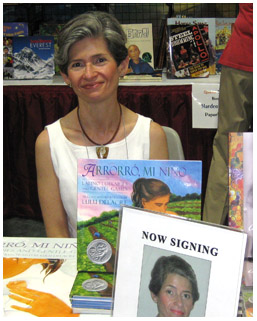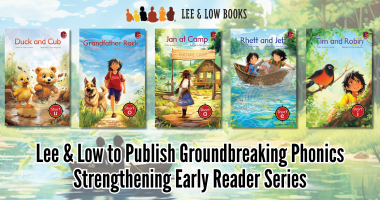![]() While attending ALA in June I observed the different styles that authors and illustrators employ when meeting the public. Creative folks’ personalities run the gamut from wildly outgoing to quiet and shy. I thought it would be helpful to share the opinions and strategies of those who have had considerable experience on the road with those who are just getting started.
While attending ALA in June I observed the different styles that authors and illustrators employ when meeting the public. Creative folks’ personalities run the gamut from wildly outgoing to quiet and shy. I thought it would be helpful to share the opinions and strategies of those who have had considerable experience on the road with those who are just getting started.

Lulu Delacre at ALA
Authors and illustrators are required to wear many hats if they want to be successful in the book business. Not only must they be the driving force behind the creation of their book, they also have to act as the book’s biggest cheerleader. Some may not be comfortable donning the marketing/publicity hat, but skills in this area can be developed over time. One question you should ask yourself is: Who else knows my book better than me? After all, your book is a project that has taken you months, even years sometimes, so isn’t it worth the effort to sing its praises from the highest rooftops?
What follows is a collection of tips from some of our authors and illustrators on how to make an impression when talking about your book during a signing, spreading enthusiasm, and selling books.
Open Invitation: If you are an author or illustrator and would like to contribute your own tips, please leave a comment below. Everyone benefits from passing the hat and sharing.
Lulu Delacre (author, Alicia Afterimage, author and illustrator, Arrorró, mi niño) How do you promote your own books without sounding boastful? That is a question to which I found the answer after decades of book signings. It is simple. Don’t think of your books as part of yourself. They are not. Yes, you spent months or even years working on that very special book. However, a book is a product. Hopefully if you’ve invested a lot of yourself in it, it is because you believe in the work you created. That is the trick. You think of your book as a product that can help someone in one way or another. You become your book’s advocate and genuinely sing its praises. After all, you have intimate knowledge of this work. You can share anecdotes about its creation, the reaction of others to it, and its possible uses in the classroom or home with that person on the other side of the signing table.
In my signings this is what I do:
- Engage the prospective buyer in conversation. By doing so I learn a bit about him or her and share a bit about myself.
- Ask the person looking at a book of mine if he or she is a teacher, librarian, or parent. This question can prompt the person to share why he or she is looking at the book.
- Switch to Spanish as soon as I suspect the person in front of me is of Latino origin. This creates an instant connection. Since many of my books celebrate the Latino heritage, it is easy to share with other Latinos what my work has to offer.
- Have a promotional piece available for the taking, be it a teacher’s guide, brochure, or bookmark.
- Remind myself that I should not be hurt or feel upset if the person decides not to buy the book.
I know that as long as I have been genuinely trying to reach the reader on a personal level, it may bear fruit. The person that leaves without getting the book might check it out of the library later, just because she or he met and talked to the author. Or, she or he might buy it at a later time when the book suddenly becomes relevant in a personal or work situation.
So, since I believe in my books, I don’t think I brag about them when I retell a plot or sing a song from them, or share their possible uses. I am merely allowing the prospective buyer to get a glimpse of the work directly from the source.
Joseph Bruchac (Author, Buffalo Song, Jim Thorpe’s Bright Path, Crazy Horse’s Vision, and Bowman’s Store): I’ve found that one thing that helps at book signings is simply making eye contact and smiling, being polite and friendly, but not being pushy. Saying “hello” or “how are you?” can sometimes lead to a conversation and then a sale. (Don’t get discouraged or act disgruntled when people just pass you by. If you look approachable, they may come back later.)
I’d suggest, too, that you plan ahead for such questions as “Who are you?” (and do not get defensive or insulted by that question) and “What’s your book about?” Be able to describe who you are in a few words and be able to summarize your book in a concise and interesting way.
For example, “I’m an American writer and storyteller with a strong interest in sharing the histories of our many different native tribal nations. And I’ve been doing this for more than forty years. My book, Buffalo Song, is the story that very few people know about the efforts of one American Indian man who helped save the buffalo from extinction.”
Lee Bennett Hopkins (poet and anthologist, Amazing Faces): I know this isn’t of much help but my best advice for a young author/illustrator to appear virgin at a conference/bookstore is to sit up tall, smile, and treat the patron like a lover.
Make sure to check out: How to Plan a Successful Book Signing Part 2 and Part 3








